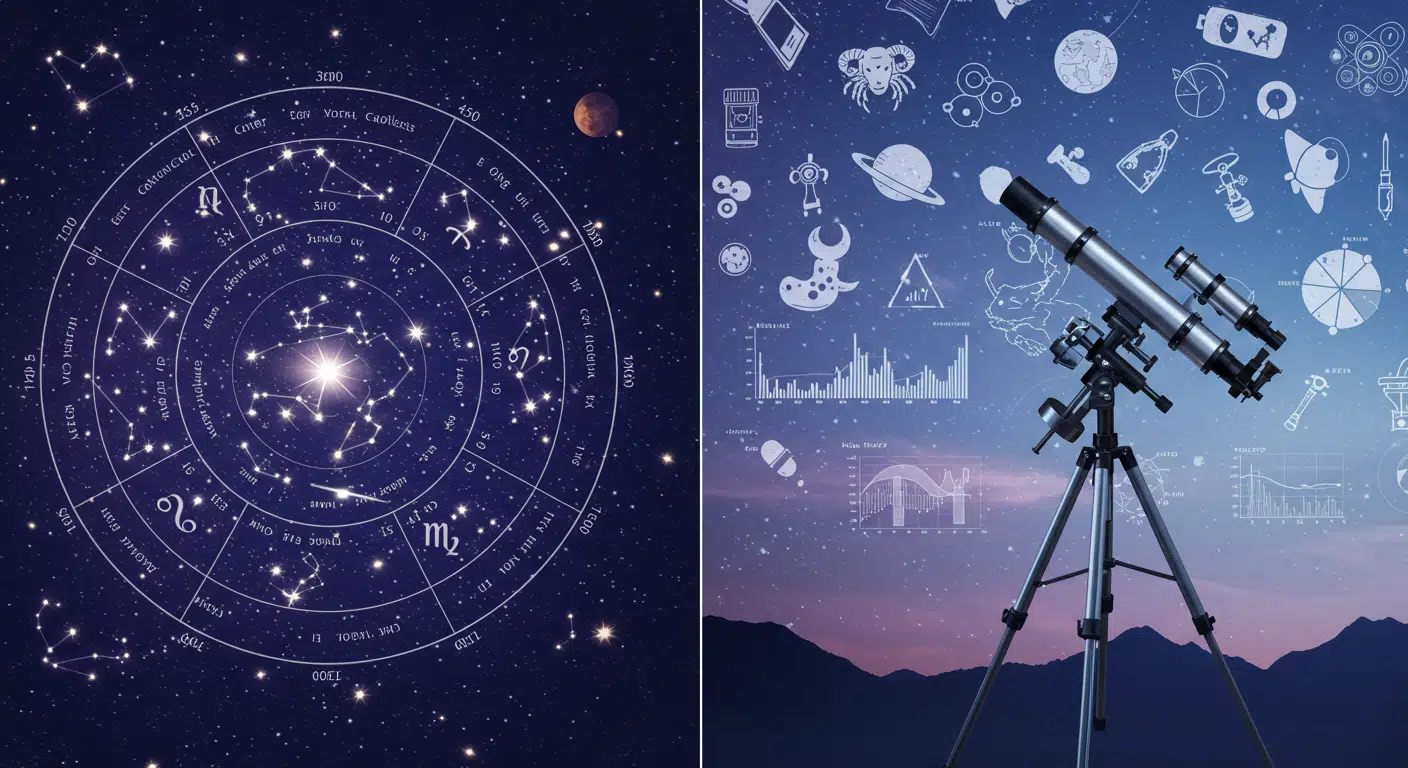Astrology occupies a contested space between long-standing cultural tradition and scientific scrutiny. Although millions consult horoscopes and birth charts for guidance, the scientific community overwhelmingly rejects astrology as lacking the hallmarks of a legitimate science. To determine whether astrology qualifies as a science or a superstition, one must assess its testability, theoretical coherence, and alignment with empirical standards.
Astrology asserts that the positions of celestial bodies at the time of a person’s birth influence their personality, behavior, and life events. These assertions typically rely on zodiac signs, planetary transits, and aspects within a natal chart. However, astrology’s predictive claims have consistently failed to meet scientific criteria. A key issue is falsifiability. Philosopher Karl Popper labeled astrology a pseudoscience because its predictions are often so vague or broad that they cannot be conclusively tested or disproven. For instance, statements like “you may encounter a challenge this week” apply universally and can be retrospectively interpreted to fit nearly any situation. In contrast, scientific theories must make specific predictions that are open to rejection based on evidence.
Empirical studies also undermine astrology’s credibility. A widely cited double-blind experiment by physicist Shawn Carlson in 1985 tested astrologers’ ability to match natal charts with personality profiles. The results showed that astrologers performed no better than chance. Similar studies have repeatedly failed to find statistically significant support for astrological predictions. Furthermore, the mechanisms proposed by astrology are physically implausible. The gravitational influence of distant planets on a newborn, for example, is negligible when compared to environmental factors like the gravitational pull of nearby objects or even lighting conditions in the delivery room. There is no scientifically known force or pathway—biological, neurological, or genetic—through which planetary positions could influence human traits or behaviors.
Astrology also lacks the progressive structure of scientific disciplines. In science, theories evolve in response to new data. By contrast, astrology has remained largely unchanged despite significant advancements in astronomy and biology. Discoveries such as exoplanets, the shifting of Earth’s axial precession, and updated star maps have not meaningfully altered astrological systems. Additionally, astrology produces no new testable hypotheses, contributes no peer-reviewed research, and does not revise its models based on failed predictions. It remains a closed, self-referential system.
Despite its scientific shortcomings, astrology maintains widespread popularity. Surveys in the United States show that around one-third of adults consider astrology to be at least “somewhat” scientific. This discrepancy between expert consensus and public belief can be explained by cognitive biases and emotional motivations. Two key psychological phenomena help explain astrology’s appeal. First, confirmation bias leads individuals to remember instances when a horoscope appeared accurate while forgetting incorrect or vague predictions. Second, the Barnum effect refers to the tendency to accept general, non-specific statements as uniquely applicable to oneself—such as being told one is “a natural leader but sometimes doubts their decisions.”
Astrology also provides psychological utility. In times of uncertainty or stress, many people turn to horoscopes and astrological frameworks as coping mechanisms. Assigning negative experiences to Mercury retrograde or difficult transits can externalize blame and restore a sense of control. Moreover, astrology offers narrative coherence: by organizing life events within a symbolic framework, it gives meaning to randomness. Socially, astrology serves as a point of connection. Online platforms like Co–Star and The Pattern blend algorithmic data with astrological symbolism, offering personalized experiences that facilitate conversation, identity formation, and community engagement.
Historically, astrology held greater intellectual legitimacy. It was intertwined with astronomy in ancient civilizations and influenced other disciplines such as medicine and weather prediction. Ptolemy’s Tetrabiblos laid out the theoretical basis of astrology alongside his astronomical work, treating it as part of natural philosophy. Even in the Middle Ages and early Renaissance, astrology informed medical diagnostics through the doctrine of humors. However, the scientific revolution and Enlightenment led to a gradual split between astronomy (which developed into a rigorous science) and astrology (which did not adopt empirical methods or revise its principles).
In the modern era, astrology has shifted further toward symbolic and spiritual interpretations. Many followers no longer insist that planetary forces physically affect behavior but instead treat astrology as a tool for introspection, similar to a secular or spiritual belief system. This repositioning has allowed astrology to thrive alongside scientific rationalism by redefining its function. Rather than claiming objective truth, it is often used subjectively—as a form of meaning-making.
The distinction between astrology’s scientific standing and its cultural value can be summarized as follows:
| Aspect | Scientific Consensus | Public Perception (U.S.) |
| Empirical Evidence | No reliable support for claims | 34% consider astrology “very/sort of” scientific |
| Mechanism | No plausible physical or biological influence | Often seen as symbolic or spiritual |
| Scientific Testing | Predictions repeatedly fail under controlled studies | Anecdotal accuracy perceived as meaningful |
| Evolution of Theory | Largely static and unresponsive to new knowledge | Adapted to digital and pop-cultural formats |
In conclusion, astrology does not meet the criteria required of scientific disciplines. It fails tests of falsifiability, lacks a demonstrable mechanism of action, and shows no evidence of cumulative or self-correcting progress. Its assertions are not grounded in biology, physics, or empirical validation. Nonetheless, astrology functions effectively as a cultural superstition. It persists because it offers psychological comfort, symbolic meaning, and social utility. Its popularity illustrates how narrative coherence and emotional resonance often outweigh statistical reasoning in human cognition. Understanding astrology’s appeal helps explain why superstition continues to thrive even in an age dominated by scientific knowledge.
